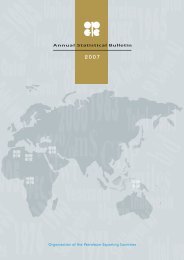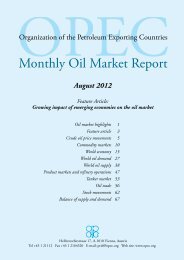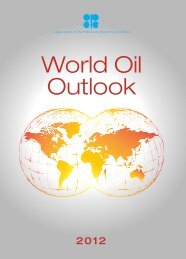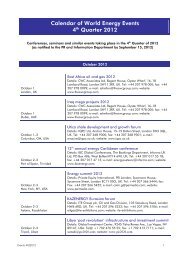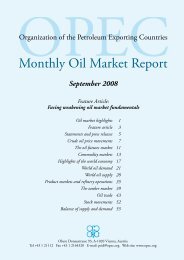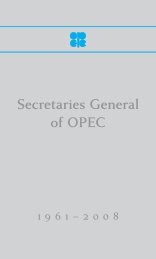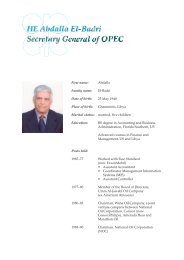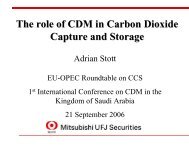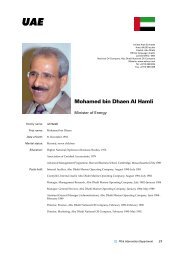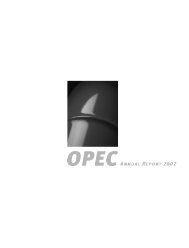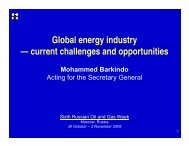2005 - OPEC
2005 - OPEC
2005 - OPEC
You also want an ePaper? Increase the reach of your titles
YUMPU automatically turns print PDFs into web optimized ePapers that Google loves.
oil in meeting future global energy demand for the socio-economic development of <strong>OPEC</strong> MCs,<br />
and provides a coherent and consistent vision and framework for the Organization’s future.<br />
The Director of Research, in his effective coordination and supervision of the research output<br />
from the Division’s departments, continued to actively seek, encourage and guide inter-depart-<br />
mental integration, so as to pool knowledge and resources and harmonise research results in<br />
order to maximise division’s output. For example, much inter-departmental collaboration was<br />
witnessed in the development of the Long-Term Strategy, and task forces were set up on such<br />
topics as the outlook for China; reserves and production capacity; the new <strong>OPEC</strong> Reference<br />
Basket (ORB); and the division’s long-term and short-to-medium term modelling capabilities.<br />
Furthermore, it should be emphasised that during <strong>2005</strong> the Director of Research was also<br />
Acting for the Secretary General, entailing considerable additional duties representing the<br />
Secretary General at outside events, and in connection with the responsibilities of coordinating<br />
and supervising the activities of the Secretariat during the year.<br />
Detailed research continued on global energy and oil developments, all of which necessitated<br />
the allocation of significant resources throughout the year. This included work on upstream<br />
developments in the reserves and resource base, a workshop having been held on reserves,<br />
including definitions and data; on the outlook for the downstream sector; China’s energy<br />
policies; the refining industry; prospects for the North Sea; Russian oil and gas company per-<br />
formance; technologies affecting oil demand, and environmental issues, such as CO 2 capture<br />
and storage (CCS).<br />
In the field of coordinating technology development the first annual Meeting of Officials of<br />
R&D Institutions in MCs was held in Doha in May, where the report on CO 2 Capture and Stor-<br />
age Research and Development: Options for <strong>OPEC</strong> was presented. This meeting endorsed the<br />
recommendation that <strong>OPEC</strong> join the IEA Greenhouse Gas R&D Programme, an international<br />
collaborative programme established in 1991 under an IEA Implementing Agreement. The<br />
programme’s key mission is to provide an objective source of information on technologies<br />
capable of making deep reductions in greenhouse gas emissions.<br />
To date most of the programme’s efforts have been focused on CCS and has included review-<br />
ing and reporting on technologies being developed by others, facilitating technology R&D and<br />
ensuring that all relevant aspects of CCS are looked into. The Doha meeting also began laying<br />
the groundwork for a future <strong>OPEC</strong>-led CCS R&D initiative. Working Groups were formed for<br />
each area of R&D: oil-to-hydrogen; oil-to-power; clean fuels; carbon management, including<br />
2



